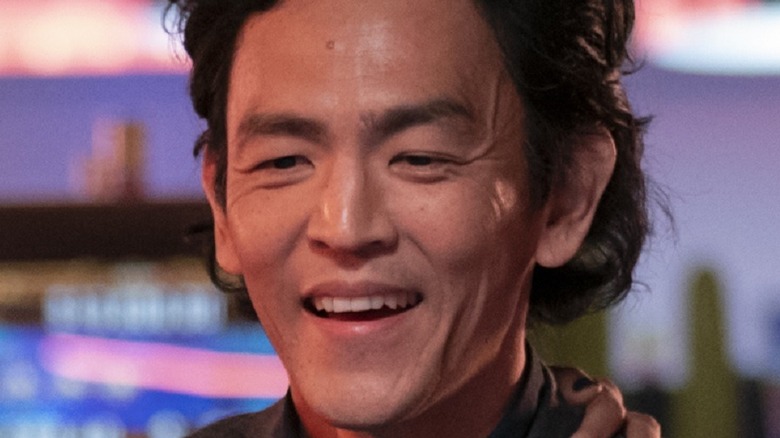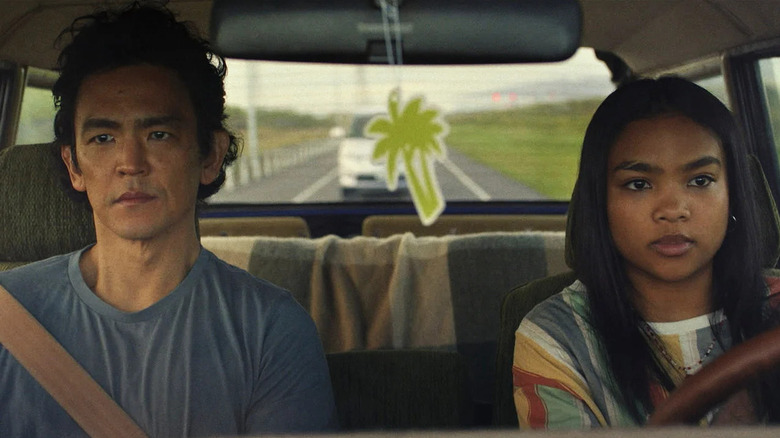Don't Make Me Go Review: You'll Like The Journey, But Not The Destination
- An authentic portrayal of a father/daughter relationship
- John Cho and Mia Isaac have lived-in chemistry
- All the usual, irresistible charms of a road trip movie
- One of the most emotionally manipulative plot twists in recent memory, which sours everything that came before
There are few surprises to be found in the road trip movie, a well-worn genre where the emotional destination is always the same even if the locations might change. If there are any flaws within the otherwise comfortingly familiar "Don't Make Me Go," it's the sharp left-turn of an ending, adding an unexpected final act twist to a warm study of a father-daughter relationship that makes the whole project feel uncomfortably emotionally exploitative by its finale. It's a particularly baffling decision and one that only overshadows everything that came before — which is a shame, considering just how infectiously likable the film is up to that point. The closing 15 minutes of the film only serve to prove that sometimes, sticking to a tried and tested formula is better than attempting to put a distinctive spin on a familiar story.
Max Park (John Cho), a single father to teenage Wally (Mia Isaac), has his entire life upended when he's given a surprise diagnosis of a fatal brain tumor; surgery only has a 20% success rate, and if he doesn't go for it, he'll have just a year left to live. With his parents long gone and no other close family to reach out to, he begins an attempt to reconnect with Wally's mother, who will be able to look after him following his death. With Wally grounded for the month after attending a party, he senses an opportunity for a road trip, telling his daughter that they're going to his college reunion — when really, he's mapping out the plans for her life without him.
A sharp left turn
It's hard to discuss the film after watching it without getting hung up on its plot twist — something which I won't reveal, even if I will allude to it completely souring the mood at least another dozen times in this review. Over the course of the road trip, there are a couple of life-altering secrets from Max's past that Wally hears for the first time, which are organically woven into the drama; if Wally's reaction to them feels too melodramatic considering the size of the revelation, do bear in mind that the character is a teenager. I was alerted to the fact there was a "divisive" plot twist prior to viewing (although I haven't seen anybody attempt to defend it), so naturally assumed that one of these family secrets was the big revelation. I couldn't be more mistaken, and the fact the film even includes a brief montage of blink-and-you'll-miss-it moments to highlight that it planted the seeds for this twist all along only further cheapens the family drama, for the sake of a manipulative shock.
As the twist lands in the film's final 15 minutes, threatening to leave the audience angry instead of moved, it seems unfair to write off the many attributes of what came before all because of a jarring last-minute narrative decision. In a genre as familiar as that as the road trip movie, when many of the story beats can be guessed before you've even sat down to watch it, the desire to take the trip relies entirely on wanting to spend time with these characters. Director Hannah Marks worked with both Cho and Isaac across a series of chemistry tests long before shooting started, a process that is often overlooked in many productions, even if it does frequently show effective results, as it does here.
The actors have a very lived-in father-daughter relationship, with Cho, in particular, excelling as the dorky and slightly boring father, who struggles to maneuver between being a strict, boundary-setting parent, and someone more fun who his daughter can have more of a banter-filled sibling dynamic with. Isaac is similarly great at capturing a universally recognizable teenage experience, the never-ending chain of disappointment at being treated like a child as you're going through a period of maturity. Both characters are long-established archetypes, but they manage to breathe life into them — a familiar journey is worth taking if you enjoy the company, after all.
A sensitive drama -- until it isn't
With its breezy indie comedy vibe, balanced with an introspective examination of how terminal illness can affect the family unit, "Don't Make Me Go" does frequently threaten to become the oft-belittled "Sundance Movie" — a faintly quirky comedy-drama that doesn't quite resonate outside of a film festival setting (this may have premiered at Tribeca, but it's very much a Sundance movie in spirit). But on no grounds is this more of a Sundance movie than in the way it handles its central topic, in a manner that'll have festival audiences reaching for tissues, and cause considerable concern when seen by people outside of that bubble.
For the most part, Max's brain tumor isn't used as a convenient plot device, even if the story it's grounded within often threats to make it one. Marks has said she was moved to adapt Vera Herbert's screenplay because of her own family history with cancer — her dad is a cancer survivor, and so she wanted to explore a father-daughter relationship put to the test after a similar diagnosis. As the story heads on the road, it never forgets the main reason he's taking them off on it, even if it does keep this information from Wally for a significant chunk of the running time (admittedly, this bit is a convenient plot device, but at least there is a believable reason as to why you'd want to shield your daughter from such bad news). The care with which the film takes to introduce a sensitive issue that many viewers will have first-hand personal experience of, and its refusal to let the parental figure become defined by his diagnosis, is admirable. It's a shame it's completely undone in the final moments when a left-field twist redefines the characters' drive to embrace life in the grossest and most manipulative way possible — not to mention one that doesn't ring true in the slightest.
"Don't Make Me Go" is for the most part a charming road trip, a multi-generational coming of age experience that's as irresistible as it is painfully familiar. But be warned: for all the many things to admire about it, you will still finish it with a bad taste in your mouth.


